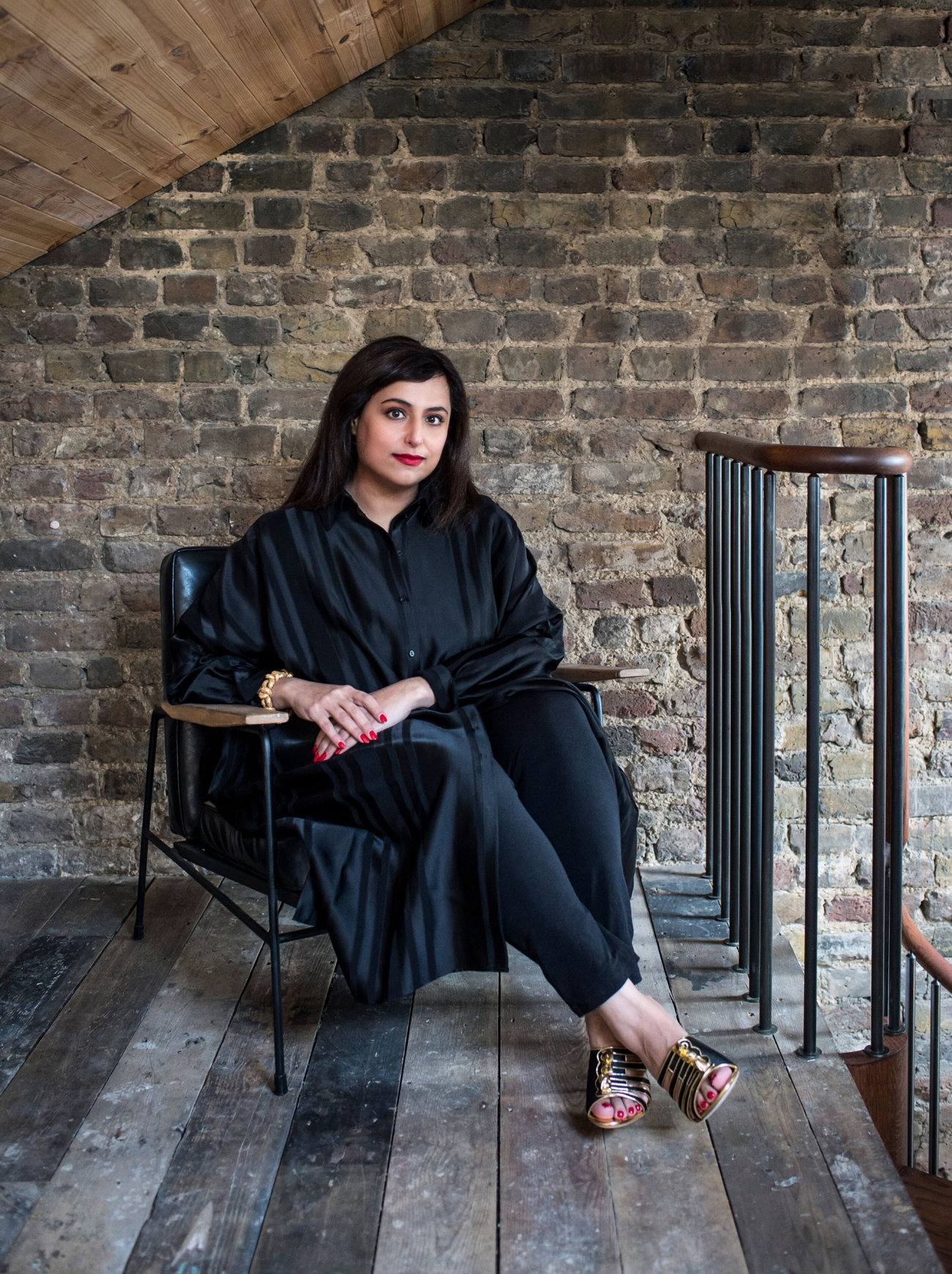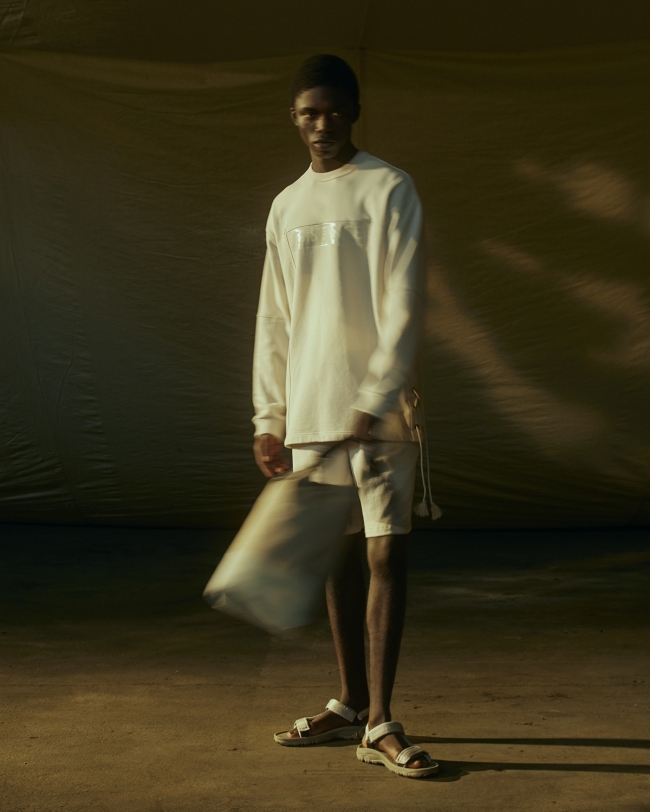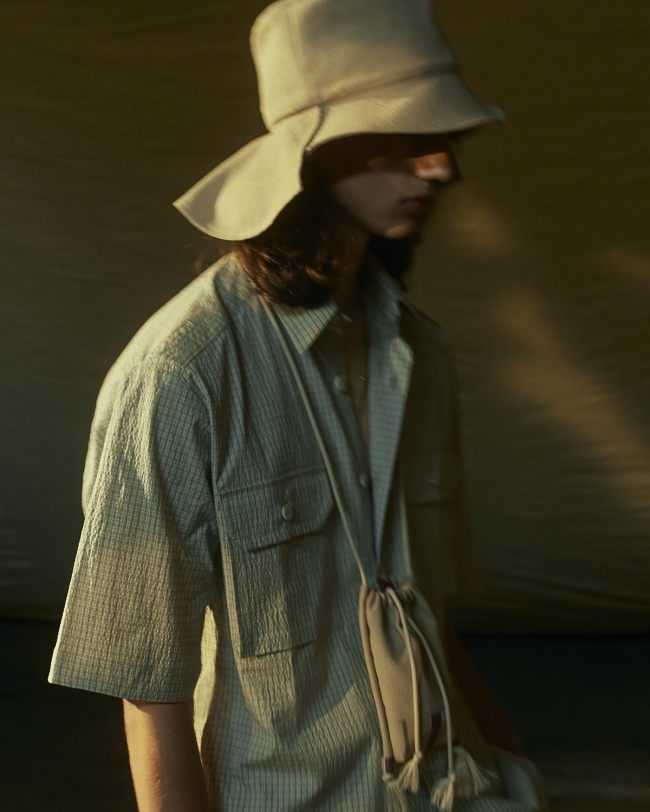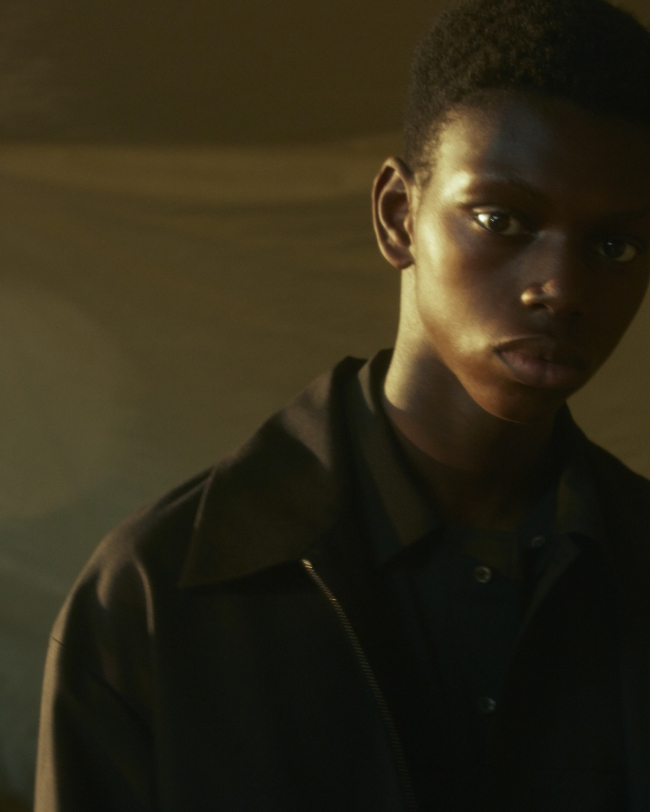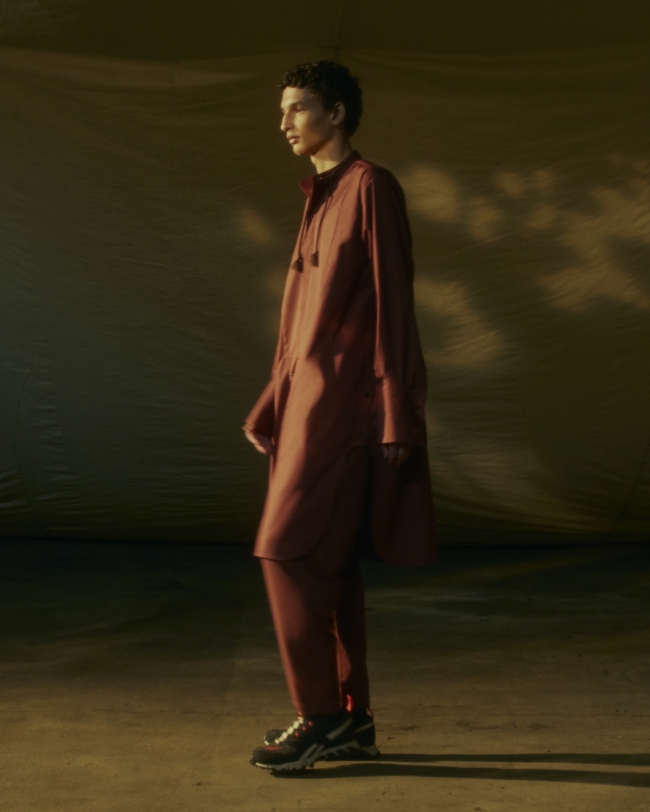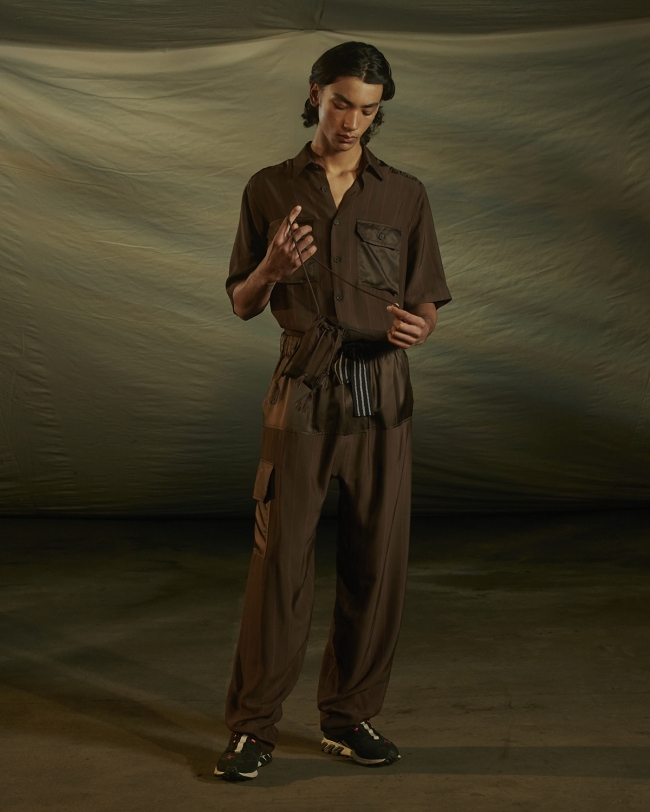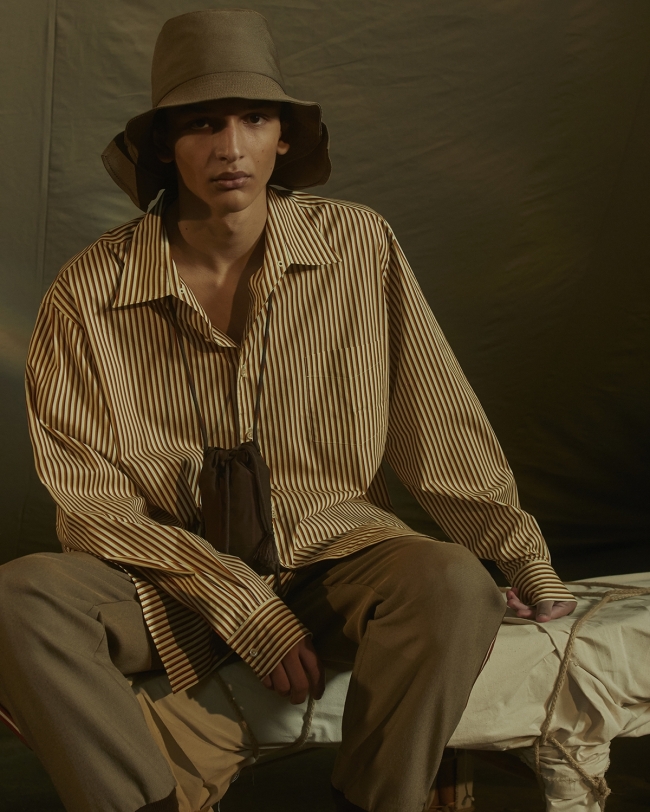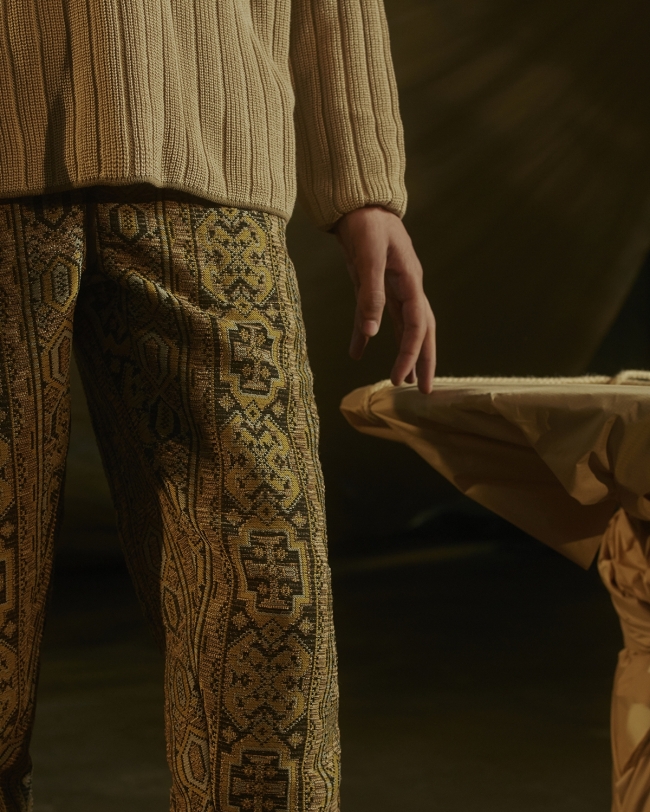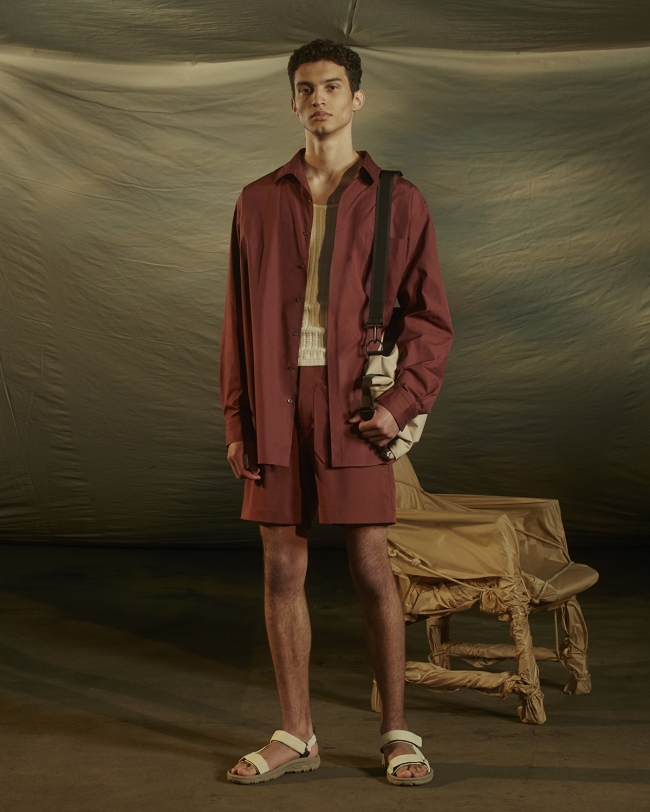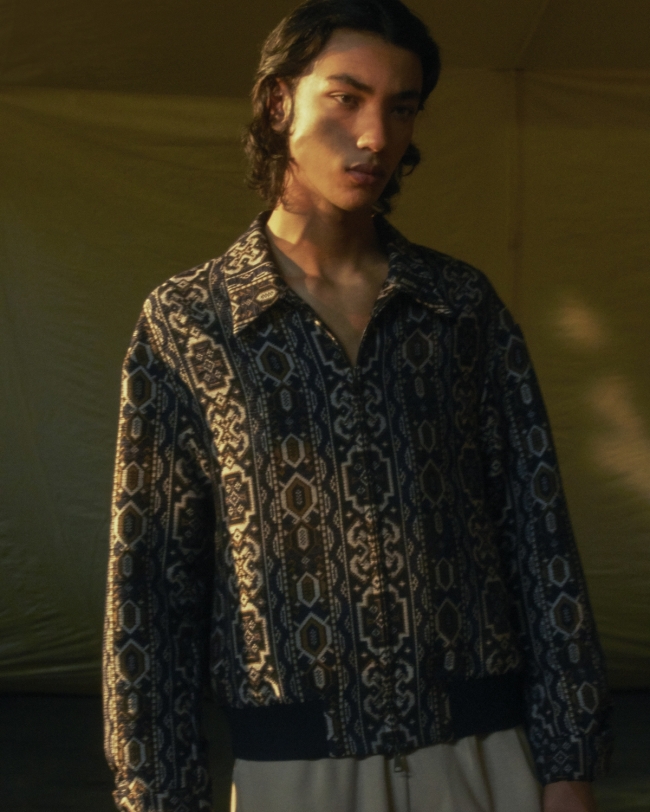Interview Hilda Kosunen
London-based menswear brand Qasimi is known for its soulful, minimalistic design ethos and its subtle way of changing the world. At the heart of the label lies the explicit, unbreakable bond between soul mates, and creative director Hoor Al Qasimi explains to us why SS21 is a pure reflection of the label's DNA.
Launching their first women's line alongside men’s, SS21 captures the soul in a gaze, in which two beings have a connection too deep for destruction and are eternally destined. Floating through the narrative is the golden shield of heritage, overflowing with colours of the desert, and an uncanny sense of solace. Paying homage to her twin brother Khalid, the brand's late founder who sadly passed away in 2019, Hoor articulates the meticulous SS21 collection through unity, soft power, and identity of the urban wanderer.
We're meeting at a hectic time with the start of a new year and your preparations for London Fashion Week. What did you think of last year's first Digital London Fashion Week?
Because I come from an arts background, it was very exciting. It's not about the show and being in front of a crowd. It's a lot of editing and very creative on that front. But of course, there's always the power of physicality and being around people, which is missed out on in the digital stage.
What is in the heart of Qasimi?
I have to say, my brother. I mean, it was his passion. It was his life, his career, he put everything into it. His destiny, values, ethics, interests, beliefs. I think that's the only way I could say it.
Who is the Qasimi man, woman or person?
They are artistic, creative and interested in changing the world in a subtle, sophisticated, cultural, intelligent and non-direct kind of way. We believe in soft power: being able to change people's views of things, bringing things to awareness and exposing them to the forefront. Looking at unity, diversity and bringing us together in terms of race, identity and gender. The clothes are interchangeable and Qasimi people share clothes; they are soul mates, but not necessarily a couple. They could even be the same person. My brother and I have that relationship as twins so there are many different ways of viewing identities and relationships, men and women these days, and this fluidity is very important for us.
For me, Qasimi has always been defined by modern minimalism yet the brand always has an uncanny political undertone to it.
I think it's important to make your voice heard. I think there's a lot of opportunities to talk about change and to talk about voices that are being silenced. For example, our 'don't shoot' T-shirt, looked at the Lebanese Civil War and we're now using that again to support charitable causes in Lebanon. And we'll continue to do so in terms of what that T-shirt represents. In our parts of the world, we've always grown up around politics so we were very vocal to talk about what we believe in, and the situations that are happening around us. You see it throughout 2020, in cases like Black Lives Matter. I think fashion does have a role to play in this as do the rest of the arts.
How does Qasimi as a brand encourage cultural exchange and unity? Why do you think this is important?
As an example, for our last video, we collaborated with a young musician, a Somali rapper (FREEK), and used the words 'we the people' from the constitution. We also worked with the Jamaican-born African-American artist Nari Ward. These are ways of bringing in conversations through collaborations and partnerships, and collaboration is always really important whenever you're trying to bring about a message of unity.
Why do you think it's important, especially right now?
In the world, you see a lot of disparity between the way people are treated. I think we have to create some sort of solidarity, where a lot of people in the global south have been oppressed or silenced. Indigenous people as well. I think it's time to use our voices together to amplify what makes us stronger, what brings us together and what makes us creative.
I think there are so many creators in different parts of the world who, given the opportunity, would really shine. As for my other background, as a curator, I think for me, that's really important. Bringing these voices together to curate and create a message, an exhibition or a statement. Many voices are better than one.
How would you describe Spring/Summer '21?
Our message of 'we the people'. That is a really strong statement. We started working with Nari Ward who is an artist that I've known for a while, and his 'We the People' works were shown at Frieze New York. I reached out to him and asked if we could use the phrase for the jackets and clothes and he happily agreed, which was really important for me. And, again, the whole copyright issue, it's always important to talk to artists and have collaborations. A lot of artists' work gets reappropriated - copyright infringement is very problematic.
It was really important to me to be able to bring my experience and background into something that I'm still learning about from the team here and everybody in the fashion field. We also use Al Sadu fabric, which is the Bedouin practice of tent weaving in different colours. This fabric and weaving incorporate heritage, whilst at the same time, there is a contemporary element of minimalism within the artwork.
Why is it important to bring the Arabic heritage to the Qasimi design?
For my brother, it was very important because it was his identity, which connected him to the roots that he was always searching for while living abroad. I think the heritage element is very important for a lot of people who maybe feel disconnected when they move away. For my brother, it was a defining feature of Qasimi. It's a London brand of Middle Eastern heritage. And that was him. And we continue to use that for the brand.
In the press release, you say that the SS21 person is an urban wanderer. How would you describe this urban wanderer?
An urban wanderer is anybody who's living between two cultures. For my brother, it was always about his heritage, and then living in London and growing up in London. So, there was always this distinction of being placed in different places at the same time. Pre-COVID we were all kind of wanderers, but now, under the current climate, I like to think about the idea of a journey: looking back at a lot of people who live in diaspora and how they connect with their heritage. And of course, the element of the nomadic people is in the weaving of the tents and everything that we use. So there's a direct connection there.
How was the design process during COVID?
Actually, we have been working really hard and still are working. But we had a lot of support from factories and producers, everybody worked really hard to make it happen. And I think that really shows a great form of solidarity. It was a communal commitment to the brand, which is really nice.
Do you have a favourite piece in the collection?
I was really thinking about this. But I have to say, the more I think about it, the 'We the People' jacket is my favourite - especially now it's more relevant than ever. I can't wait to put it on.
What is the importance of human connection, especially now? And how does the SS21 encourage that?
Human connection is very important. As I mentioned at the start, you can't isolate people and just go digital. I think that more than ever, we're realising that coming together is essential not only for physical work but for our mental health, our creativity and also to discuss important issues. I think doing this all digitally feels controlled. Human connection is the idea of people coming together to create change and to produce new things.
What do you hope for in 2021?
Well, I think it's very sad that a lot of people lost their lives to COVID. I hope that we find solutions across the world to help humanity come to terms with what has happened. I feel very bad that a lot of businesses are struggling and I hope that they recover. So of course, all of those are our hopes for 2021. But that people can come back together and just be in the shared space is the main one. I think in terms of digital growth, the experience has helped us in that we've been able to get further reach where people aren't able to travel. So the idea of balance is always really good: you can reach out to people who aren't able to travel to certain events, but at the same time, you still need to connect with the human, and it's about finding the right way to do that. It's going to be complicated, but manageable.
